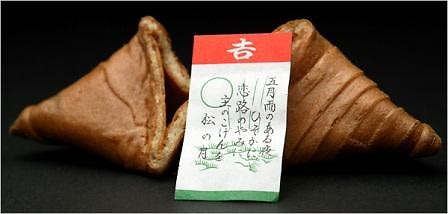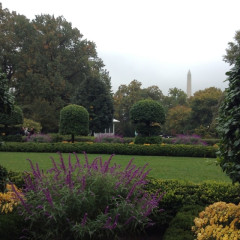
[Photo from the NY Times]
I have saved the last 5 "fortunes" from my lunches over the past year from Shun Lee Palace. I had to get them out again after reading Jennifer 8. Lee's article in the Times today titled "Solving a Riddle Wrapped in a Mystery Inside a Cookie". It has become the #1 emailed style section story of the day, so I am not the only one silly enough to be curious about the history of our beloved fortune cookie.
"Be mischievous and you will not be lonesome." "You find beauty in ordinary things, do not lose this ability." "Now is the time to try something new." "You would make a good lawyer" and my personal favorite: "It doesn't matter. Who is without a flaw?"
In no particular order, there you have my fate. Spelled out in red letters with smiley faces on both ends. Whether you believe in the powers of the universe wrapped up in these cookies or not, they make up a big business, with 3 billion made each year (almost all in the U.S.). The ultimate Chinese-American tradition, they are a treat that transcends our nation's borders. From my own Midwestern town, to the great city of Manhattan, we have all been growing up with these little wafers telling us (at least for that day) what they thought of us. Which is why it's interesting to find out the REAL history behind them, like how they came from being Japenese in origin, to a staple of the Americanized-Chinese cuisine.
While people have been trying to trace back just when the original fortune cookie inception took place, most historians agree it happened was in the early 19th century n Kyoto. Yasuko Nakamachi, a Japanese student from Kanagawa University found the earliest known drawing in a child's story book dated 1878. Here is the short version of how the cookie landed in my lap, at Shun Lee's, in 2008:
Some Japanese immigrants took over the "fortune crackers" as they were called, which they had made in their small, bakery-like establishments back home. Then two very important things happened in America's history. First, in the 20's and 30's, many Japanese chop-suey restaurateurs noticed that their chopped fish heads weren't popular in this new country and started serving more Americanized Chinese cuisines. Second, WWII. When we rounded up most of the Japanese and put them in internment camps. Now the ONLY fortune cookies were at these Americanized Chinese establishments, which as you can imagine, many of the actual Chinese-Americans had scooped up. After the war, soldiers everywhere went home and wanted to know why their hometown Chinese restaurants didn't have fortune cookies like the ones in California.
Thus the fortune cookie industry infiltrated our country. This is also why it is an uniquely Chinese-American tradition, and you would be endlessly searching for your after-meal fortune in today's actual CHINA.
For more info, look for Lee's novel: "The Fortune Cookie Chronicles" on sale this March.


.jpg)
.jpg)



.jpg)
.jpg)
.jpg)



